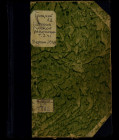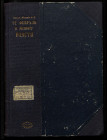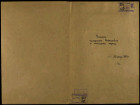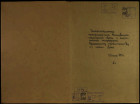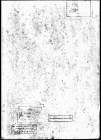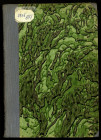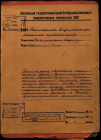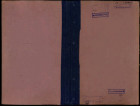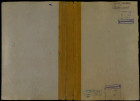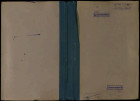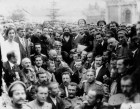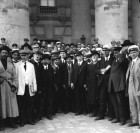The Second Crisis of the Provisional Government

The second crisis of the Provisional Government fell on the period of the July disturbances (also known as the July Days) following the ill-fated military offensive. On July 2 (15), 1917, members of the Constitutional Democratic Party (Cadets) opposed the adoption of the II Universal of the Central Council of Ukraine and the recognition of the autonomy of Ukraine (the final decision on its form was postponed until the Russian Constituent Assembly) and withdrew from the government.
On July 7 (20), the Minister of Justice P. N. Pereverzev, who, without agreement with representatives of the Socialist parties of the Provisional Government, released some compromising evidences of the Bolsheviks’ connections with Germany, resigned office. On the same day, the Chairman of the Council of Ministers and Minister of Internal Affairs G. E. Lvov vacated office as well. A. F. Kerensky took over as head of the government. On July 24 (August 6) the second coalition cabinet of the Provisional Government, composed mostly of socialists, was formed with Kerensky at its head. The Petrograd Soviet of Workers 'and Soldiers' Deputies declared after that an unconditional support of the Provisional Government. L. G. Kornilov was appointed Supreme Commander-in-Chief instead of A. A. Brusilov.
In attempt to consolidate various social and political forces the Provisional Government convened the State Conference in Moscow, bringing together about 2500 people. A. F. Kerensky was its chairman. However, during the meeting, the Provisional Government was harshly criticized, and the statements of both liberals and military-grades were of a radical nature: they proposed a liquidation of the Soviets, a prohibition of freedom of assembly, the restoration of the death penalty, etc. Such the ideas paved the way for the establishment of a military dictatorship.
Outlawed after the suppression of the July uprising Bolsheviks were the only who have not attended the meeting. They were partly under arrest, some of them — in exile. However, they managed to hold the VI Party Congress from July 26 (August 8) to August 3 (16), on the basis of which a course toward an armed uprising was generally taken. In addition, following the results of the Congress, L. D. Trotsky was admitted into the party and was elected to the Central Committee (in his absence, since he was in custody at that time).
Another important issue of the summer of 1917 was the separatist movements of the ethnic borderlands, which intensified following the crisis situation in the Center.
The section contains the timelines, research works, memoirs, archival documents, and visual materials, thematically organized and familiarizing with the numerous contradictory tendencies of mid July — mid August 1917.
- Timelines
Revolution of 1917. T. 3. June - July
Revolution of 1917. Moscow: State Publishing House, [1923-1930]; Petrograd. Film T. 3: June - July. [1923].События с 12 июля по 3 августа 1917 г. (сканы 181–255), декларация Временного правительства к Украинской Раде от 2 июля (сканы 314–315), Резолюция, принятая на объединенном заседании ВЦИК и Исполнительный комитет Всероссийского Совета Крестьянских Депутатов 4 июля (по вопросу о власти) (скан 329), закон об автономии, принятый Финляндским сеймом 5 июля (скан 330), документы от 13 июля – 3 августа (сканы 341–395).Revolution of 1917. 4. August - September
Avdeev. Nikolay Nikolaevich. Revolution of 1917. Moscow: State Publishing House, 1923; Petrograd.
T. 4: August - September. 1924.События с 4 августа по 25 августа (сканы 19–100), документы за указанный период (сканы 305–346)
- Researches, recollections
October Revolution
Alekseev, Sergei Alexandrovich (1878-). October Revolution. Moscow: The Young Guard, 1929; Leningrad.1917
Lidak, Otto Avgustovich. 1917 year. Moscow: Party Publishing House, 1932; Leningrad.Глава «VI съезд партии и смена лозунгов» (сканы 67–84)
History of the Russian Revolution. T. 2. The October Revolution
Trotsky. Lev Davidovich. 1879-1940. History of the Russian Revolution. Berlin: Granit Publishers, 1933.
T. 2: The October Revolution. 1933.Глава «Контр-революция поднимает голову» (сканы 142–165)
From February to the seizure of power
Ilyin-Genevsky, Alexander Fedorovich (1894-1941). From February to the seizure of power. Leningrad: working publishing house "Priboy", [1927].Глава «Накануне Октября» (часть главы, касающаяся VI съезда партии и дальнейшей революционной деятельности до середины сентября) (сканы 100–109)
- Archival materials
Statement [A. F. Kerensky] on his consent to lead the government
KERENSKY ALEXANDER FEDOROVICH, POLITICAL ACTIVITY, MEMBER OF THE PARTY OF SOCIALIST-REVOLUTIONORS, LAWYER, MINISTER-CHAIRMAN AND THE SUPREME COMMANDER OF ARMED FORCES OF THE INTERIM STATE GOVERNMENT (since May 24, 1917). 1881-1970.
Statement [A. F. Kerensky] on his consent to lead the government.List of Ministers of the Provisional Government with Kerensky's notes
KERENSKY ALEXANDER FEDOROVICH, POLITICAL ACTIVITY, MEMBER OF THE PARTY OF SOCIALIST-REVOLUTIONORS, LAWYER, MINISTER-CHAIRMAN AND THE SUPREME COMMANDER OF ARMED FORCES OF THE INTERIM STATE GOVERNMENT (since May 24, 1917). 1881-1970.
List of Ministers of the Provisional Government with notes by Kerensky.Declarations and appeals of the Provisional Government to the population of Russia in connection with the political and economic situation in the country. Scripts and copies
Collection: Declarations and appeals of the Provisional Government to the population of Russia in connection with the political and economic situation in the country. Originals and copies (1917)Проекты деклараций и обращений от июля–августа 1917 г. (сканы 5–25)Correspondence with the Ministry of the Sea about the funds received by Kerensky
OFFICE OF THE MINISTER-CHAIRMAN OF THE TEMPORARY GOVERNMENT.
Correspondence with the Ministry of the Sea about the funds received at Kerensky's disposal.Letter from General Alexeyev to Kerensky AF on the state of the army
KERENSKY ALEXANDER FEDOROVICH, POLITICAL ACTIVITY, MEMBER OF THE PARTY OF SOCIALIST-REVOLUTIONORS, LAWYER, MINISTER-CHAIRMAN AND THE SUPREME COMMANDER OF ARMED FORCES OF THE INTERIM STATE GOVERNMENT (since May 24, 1917). 1881-1970.
Letter from General Alexeyev to Kerensky AF about the state of the army.The telephonogram of the chairman of the Moscow City Duma with an expression of support to the Provisional Government on behalf of the Duma
KERENSKY ALEXANDER FEDOROVICH, POLITICAL ACTIVITY, MEMBER OF THE PARTY OF SOCIALIST-REVOLUTIONORS, LAWYER, MINISTER-CHAIRMAN AND THE SUPREME COMMANDER OF ARMED FORCES OF THE INTERIM STATE GOVERNMENT (since May 24, 1917). 1881-1970.
Telephonogram of the chairman of the Moscow City Duma with an expression of support to the Provisional Government on behalf of the Duma.Kokoshkina
KERENSKY ALEXANDER FEDOROVICH, POLITICAL ACTIVITY, MEMBER OF THE PARTY OF SOCIALIST-REVOLUTIONORS, LAWYER, MINISTER-CHAIRMAN AND THE SUPREME COMMANDER OF ARMED FORCES OF THE INTERIM STATE GOVERNMENT (since May 24, 1917). 1881-1970. Film Kokoshkina.Telegrams of various organizations and unions with the expression of confidence in the Minister-Chairman A. Kerensky
KERENSKY ALEXANDER FEDOROVICH, POLITICAL ACTIVITY, MEMBER OF THE PARTY OF SOCIALIST-REVOLUTIONORS, LAWYER, MINISTER-CHAIRMAN AND THE SUPREME COMMANDER OF ARMED FORCES OF THE INTERIM STATE GOVERNMENT (since May 24, 1917). 1881-1970.
Telegrams of various organizations and unions with the expression of confidence to the Minister-Chairman AF Kerensky.A greeting telegram from the personnel of the cruiser Gromoboy to the minister-chairman of the Provisional Government, Kerensky
OFFICE OF THE MINISTER-CHAIRMAN OF THE TEMPORARY GOVERNMENT.
Welcome telegram of the personnel of the cruiser Gromoboy to the minister-chairman of the Provisional Government Kerensky.Welcome telegram of the Russian students in Brussels addressed to Kerensky A.F.
OFFICE OF THE MINISTER-CHAIRMAN OF THE TEMPORARY GOVERNMENT.
Welcome telegram of Russian students in Brussels to Kerensky A.F.Telegram of the group of French democracy at the congress in Moscow in the name of Kerensky AF
OFFICE OF THE MINISTER-CHAIRMAN OF THE TEMPORARY GOVERNMENT.
The telegram of the group of French democracy at the congress in Moscow addressed to Kerensky A.F.Gonzalez de Sinares Jeanne on the expression of admiration for Kerensky's article in "Eco de Paris"
KERENSKY ALEXANDER FEDOROVICH, POLITICAL ACTIVITY, MEMBER OF THE PARTY OF SOCIALIST-REVOLUTIONORS, LAWYER, MINISTER-CHAIRMAN AND THE SUPREME COMMANDER OF ARMED FORCES OF THE INTERIM STATE GOVERNMENT (since May 24, 1917). 1881-1970.
Gonzalez de Sinares Jeanne about the expression of admiration for Kerensky's article in Eco de Paris.An unidentified person criticizing the activities of Kerensky
KERENSKY ALEXANDER FEDOROVICH, POLITICAL ACTIVITY, MEMBER OF THE PARTY OF SOCIALIST-REVOLUTIONORS, LAWYER, MINISTER-CHAIRMAN AND THE SUPREME COMMANDER OF ARMED FORCES OF THE INTERIM STATE GOVERNMENT (since May 24, 1917). 1881-1970. Film An Unidentified Person Criticizing Kerensky's Work.Letters from private individuals who condemn the activities of the Socialist-Revolutionary Menshevik Petrograd Soviet and its members, in particular Kerensky, Chkheidze and others
All-Russian Central Executive Committee of the Soviets of Workers 'and Soldiers' Deputies of the First convocation.
Letters of private individuals condemning the activities of the Socialist-Revolutionary Menshevik Petrograd Soviet and its members, in particular Kerensky, Chkheidze and others.Документы, касающиеся второго кризиса Временного правительства (сканы 11–19, 32-122, 128–129)The statements of the Bolsheviks - members of the Soviets of Workers 'and Soldiers' Deputies on the illegality of their arrest and the demands for their release, statements of private individuals about the release from custody. Statement by Ya. M. Sverdlo
All-Russian Central Executive Committee of the Soviets of Workers 'and Soldiers' Deputies of the First convocation.
Statement of the Bolsheviks - members of the Soviets of Workers 'and Soldiers' Deputies on the illegality of their arrest and the demands for their release, statements of private individuals on release from custody. Statement by Ya. M. Sverdlov (autograph, p. 41).Документы, касающиеся второго кризиса Временного правительства (сканы 60–114) - Media publications
Cuttings from the newspaper "Herald of the Provisional Government" for 1917. July August. Part 1
Print reviews, extracts and cuttings from print (collection).
Scraps from the newspaper "The Herald of the Provisional Government" for 1917. July August. Part 1.Манифест о роспуске сейма 18 (31) июля 1917 г. и производстве новых выборов (скан 11); состав Временного правительства, обнародованный 25 июля 1917 г. (скан 13); обращение Временного правительства к населению Государства, 26 июля (скан 14); действия Временного правительства (сканы 16-18)Cuttings from the newspaper "Herald of the Provisional Government" for 1917. July August. Part 2
Print reviews, extracts and cuttings from print (collection).
Scraps from the newspaper "The Herald of the Provisional Government" for 1917. July August. Part 2.События с 9 июля по 1 августа (сканы 34–155)Cuttings from the newspaper "Herald of the Provisional Government" for 1917. July August. Part 3
Print reviews, extracts and cuttings from print (collection).
Scraps from the newspaper "The Herald of the Provisional Government" for 1917. July August. Part 3.Указы Временного правительства с 9 июля по 25 августа (сканы 11–75) Указы Временного правительства (о снятии Брусилова и назначении ВГК Корнилова) (скан 24)From February to October
Lenin, Vladimir Ilyich (1870-1924).From February to October.[Moscow]: Partizdat the CPSU (b) 1937.Работа «Уроки революции» от конца июля 1917 г.
(сканы 121–139)Compositions. Series 1. Historical preparation of October. T. 3. 1917
Trotsky. Lev Davidovich. 1879-1940. Compositions. Moscow: State Publishing House, 1924 - 1927; Leningrad.
T. 3: 1917. Moscow: The State Publishing House, [1924].Главы «Напор контр-революции» (разделы «Капитуляция мелкобуржуазной демократии перед контр-революцией», «Из тюрьмы»), «Агония мелкобуржуазной демократии» (раздел «Перед корниловщиной») (сканы 257–346)
The year of the revolution (February 1917 - March 1918)
Zinoviev, Grigory Evseevich (party and statesman, 1883-1936). The year of the revolution (February 1917 - March 1918). Leningrad: State Publishing House, 1925.Статьи Г.Е. Зиновьева от июля–августа 1917 г. (сканы 231–272)
On the approaches to October
Bukharin, Nikolai Ivanovich (statesman, 1888-1938). On the approaches to October. Moscow: State Publishing House, 1926; Leningrad.Статьи Н.И. Бухарина от июля–августа 1917 г. (сканы 76–95)
- Moscow State Conference
Stages of the Great Russian Revolution
Stepnoy, Nikolai Alexandrovich (1878-1947). Stages of the Great Russian Revolution. Samara: The Steppe, 1918.Раздел «Московское государственное совещание» (сканы 38–58)
Year of struggle
Milyukov, Pavel Nikolaevich (1859-1943). Year of struggle. St. Petersburg: Typography of TV "Public benefit", 1907.Игнатов Е. Мобилизация контр-революционных сил к московскому государственному совещанию и всеобщая забастовка московских рабочих (сканы 34–71)Historical speeches of the generals: M. Alekseev, L. Kornilov and A. Kaledin, delivered at the State meeting on August 12-14, 1917
Historical speeches of the generals: M. Alekseev, L. Kornilov and A. Kaledin, delivered at the State meeting on August 12-14, 1917. Moscow: People's Thought, 1917.Description of the opening of the Moscow State Conference and Kerensky's speech at the opening and closing of the meeting
STATE MEETING 1917 Moscow.
Description of the opening of the Moscow State Conference and Kerensky's speech at the opening and closing of the meeting.Transcripts of speeches by Kaledin, Gruzinov, Kornilov, Chkheidze and others
STATE MEETING 1917 Moscow.
Transcripts of speeches by Kaledin, Gruzinov, Kornilov, Chkheidze and others.A certificate issued to FF Kokoshkin for attendance at the State Meeting in Moscow as a state controller
KOKOSHKIN FEDOR FEDOROVICH, LAWYER, PRIVAT DOCTOR OF MOSCOW UNIVERSITY, DEPUTY OF THE STATE DUMA, STATE CONTROLLER OF THE INTERIM STATE GOVERNMENT, MEMBER OF THE CONSTITUTIONAL DEMOCRATIC PARTY.
A certificate issued to FF Kokoshkin for attendance at the State Meeting in Moscow as a state controller. - Regions in the summer of 1917
1917 in Moscow
1917 in Moscow. [Moscow]: The Moscow Worker, 1934.События с 8/21июля по 24 августа/6 сентября 1917 г. (сканы 107–135)1917 in the Kiev region
1917 in the Kiev region. [Kharkov]: State Publishing House of Ukraine, 1928.События на Украине с 1/14 июля по 18/31 августа 1917 г. (сканы 182–247)Chronicle of historical events on the Don, Kuban and the Black Sea. Issue. 1. March 1917 - March 1918
Chronicle of historical events on the Don, Kuban and the Black Sea. Rostov on Don: Rostov Regional Book Publishing, 1939.
Вып. 1: March 1917 - March 1918, 1939.События с 7/20 июля по 13/26 августа 1917 г. (сканы 57–66)
Revolution of 1917 in Azerbaijan
Belenky, S.Revolution of 1917 in Azerbaijan. Baku, 1927.События в Азербайджане с 7/20 июля по 20 августа/2 сентября 1917 г. (сканы 83–107)Smolensk in the revolution of 1917
Daiyan, M. Smolensk in the revolution of 1917. Smolensk: edition of Smolensk istparta, 1927.О событиях во второй половине июле – первой половине августа 1917 г., деятельности Смоленского Совета рабочих и солдатских депутатов (сканы 22–26)- Archival materials on ethnic borderlands
Protocol of the meeting of the provincial commissars and representatives of the provincial executive committees of Ukraine and Bessarabia on July 25 and 26, 1917 (copies); memorandums of the Central Rada of the bourgeois-nationalist government of Ukraine
Department of General Affairs of the Ministry of the Interior of the Provisional Government.
Minutes of the meeting of the provincial commissars and representatives of the provincial executive committees of Ukraine and Bessarabia on July 25 and 26, 1917 (copies); memorandums of the Central Rada of the bourgeois-nationalist government of Ukraine on the regional administration in the Ukrainian gubernias and on the autonomy of Ukraine; reports on the first Ukrainian Military Congress on May 5-8, 1917, and the All-Ukrainian Congress on July 5-12, 1917; appeals, memorandum and letters...Memorandum of Bessarabian cooperatives to the Provisional Government on the national self-determination of Bessarabia
DEPARTMENT OF GENERAL MINISTRY OF THE INTERIOR OF THE TEMPORARY GOVERNMENT.
Memorandum of Bessarabian cooperatives to the Provisional Government on national self-determination of Bessarabia.Protocols and resolutions of general meetings of residents of the counties of the Kholm province on the reunification of the Kholmskaya province with Russia and memoranda of various people with a protest against the inclusion of the Kholm province in Pola
DEPARTMENT OF GENERAL MINISTRY OF THE INTERIOR OF THE TEMPORARY GOVERNMENT.
Protocols and resolutions of general meetings of residents of the counties of Kholm province on the reunification of the Kholm province with Russia and memoranda of various people with a protest against the inclusion of the Kholm province in Poland.Protocols and resolutions of the assemblies of the refugees of Kholmschina, living in various provinces of Russia, about the reunification of the Kholmskaya province with Russia
DEPARTMENT OF GENERAL MINISTRY OF THE INTERIOR OF THE TEMPORARY GOVERNMENT.
Protocols and resolutions of the assemblies of the refugees of Kholmsk, living in various provinces of Russia, about the reunification of the Kholmskaya province with Russia.Decisions of the Lithuanian National Council and Helsingfors Lithuanian Society; the provisions of the Provisional Committee for the Administration of Lithuania and correspondence with the Ministers of the Provisional Government on the exclusion of the Su
DEPARTMENT OF GENERAL MINISTRY OF THE INTERIOR OF THE TEMPORARY GOVERNMENT.
Resolutions of the Lithuanian National Council and the Helsingfors Lithuanian Society; the provisions of the Provisional Committee for the Administration of Lithuania and correspondence with the Ministers of the Provisional Government on the expulsion of the Suvalk province from the Kingdom of Poland and on the replacement of posts in the judicial department and the Ministry of Public Education.The journals of the meetings of the commission for the development of the project of management and self-government in the Baltic provinces from May 26 to 29, 1917, decrees (copies) and draft provisions of the Provisional Government on the same issue. Lis
DEPARTMENT OF GENERAL MINISTRY OF THE INTERIOR OF THE TEMPORARY GOVERNMENT.
Journal of the meetings of the commission for the development of the project of management and self-government in the Baltic provinces from 26 to 29 May 1917, decrees (copies) and draft provisions of the Provisional Government on the same issue. List of members of the Commission for the development of the project management and self-government in the Baltic provinces. - Archival materials on regional revolutionary movements
Correspondence with the Vitebsk, Ryazan, Simbirsk and Chernigov Provincial Commissars on the unauthorized seizure of landlord estates by peasants, cutting timber, on the distribution of land by land committees
DEPARTMENT OF GENERAL MINISTRY OF THE INTERIOR OF THE TEMPORARY GOVERNMENT.
Correspondence with the Vitebsk, Ryazan, Simbirsk and Chernigov Provincial Commissars on the unauthorized seizure of landowner estates by peasants, cutting timber, on the distribution of land by land committees.Correspondence with the Novgorod, Penza, Tambov and other district commissars on the revolutionary actions of peasants in Russia
DEPARTMENT OF GENERAL MINISTRY OF THE INTERIOR OF THE TEMPORARY GOVERNMENT.
Correspondence with the Novgorod, Penza, Tambov and other county commissioners about the revolutionary actions of peasants in Russia.Correspondence with the ministries of the Provisional Government, public organizations and county commissioners about the revolutionary actions of the peasants in the Penza region, the intervention of the Saratov Executive Committee of the Soviets of Sold
Department of General Affairs of the Ministry of the Interior of the Provisional Government.
Correspondence with the ministries of the Provisional Government, public organizations and county commissioners about the revolutionary actions of peasants in the Penza region, about the intervention of the Saratov Executive Committee of the Soviets of Soldiers 'and Workers' Deputies in the actions of the city administration to grant postponements to those who are liable for military service, to convene a meeting of representatives of provincial, regional and city executive committees and...
- Illustrations
- The composition of the second coalition cabinet
Nekrasov Nikolai Vissarionovich (1879-1940)
Nekrasov Nikolai Vissarionovich (1879-1940). St. Petersburg, 1910.Заместитель министра-председателя и министр финансовMember of the Provisional Government ND Avksentiev among the military
Member of the Provisional Government ND Avksentyev among the military. 1917.Министр внутренних делThe leader of the Socialist Revolutionary Party, VM Chernov, in the group of deputies of the All-Russian Peasant Council
Nappelbaum, Moses Solomonovich (1869-1958). Leader of the Socialist Revolutionary Party, VM Chernov, in the group of deputies of the All-Russian Peasant Council. Petrograd, 1917.Министр земледелияMinister of the Provisional Government AM Nikitin
Minister of the Provisional Government AM Nikitin. Petrograd, 1917.Министр почт и телеграфовMI Skobelev, NS Chkheidze, GV Plekhanov in the Presidium of the First All-Russian Congress of Soviets of Workers 'and Soldiers' Deputies
M. I. Skobelev, N. S. Chkheidze, G. V. Plekhanov in the Presidium of the First All-Russian Congress of Soviets of Workers 'and Soldiers' Deputies. Petrograd, June 1917.Minister of Agriculture VM Chernov and Minister of Internal Affairs ND Avksentev in the group
Minister of Agriculture VM Chernov and Interior Minister ND Avksentev in the group. 1917.Opening of the sailor's university. [Fourth from the right - AF Kerensky, second from the right - PA Kropotkin]
Opening of the sailor's university. [Fourth from the right - AF Kerensky, second from the right - PA Kropotkin]. - Moscow State Conference
At the Moscow State Meeting
At the Moscow State Meeting.Participants in the State Meeting PN Milyukov and PA Kropotkin
Participants in the State Meeting PN Milyukov and PA Kropotkin. Moscow, August 1917.Participants in the State Meeting PN Milyukov, NM Kishkin and AI Shingarev
Leonidov Participants in the State Meeting PN Milyukov, NM Kishkin and AI Shingarev. Moscow, August 1917.L. G. Kornilov in the group of members of the Provisional Government before the State Meeting
L. G. Kornilov in the group of members of the Provisional Government before the State Meeting.
[Moscow], 1917.A group of participants at the State Meeting at the Bolshoi Theater
Svishtov-Paola, Nikolai Ivanovich (1874-1964). A group of participants at the State Meeting at the Bolshoi Theater. Moscow, August 1917.В первом ряду (слева): П. Н. Милюков, М. И. Шефтель - Public loan
Days of the "Loan of Freedom" in Petrograd on July 26-28
Days of the "Loan of Freedom" in Petrograd on July 26-28.Loan of Liberty. On the defense of free Russia
Loan of Liberty. To protect free Russia.Selling bread - buy a loan of freedom
Selling bread - I'll buy a loan of Freedom.Sold bread - bought a loan
I sold bread - bought a loan.Sow a good seed, subscribe to the Loan of Freedom
Sow a good seed, subscribe to the Loan of Freedom.What is true is the truth: freedom depends on the "Loan of Freedom"
What is true is the truth: freedom depends on the "Loan of Freedom".So in 1917, the salvation of the motherland depended on the success of the Loan of Liberty
So in 1917, the salvation of the homeland depended on the success of the Loan of Liberty.






